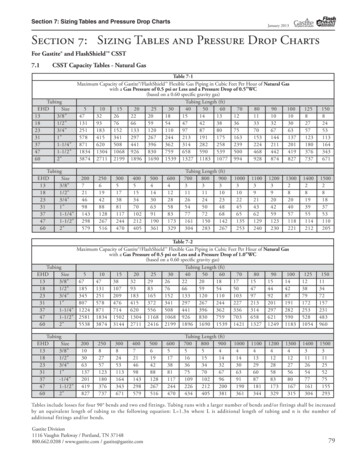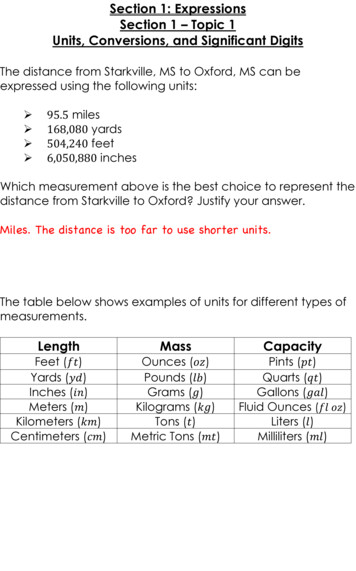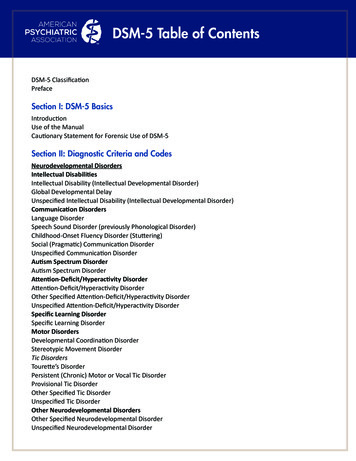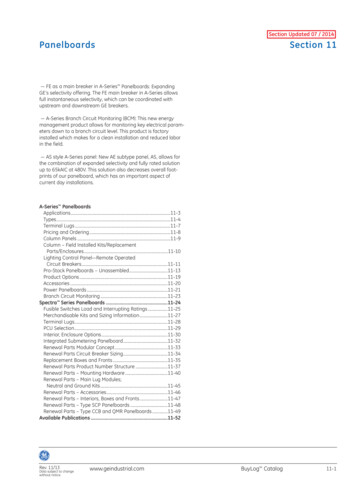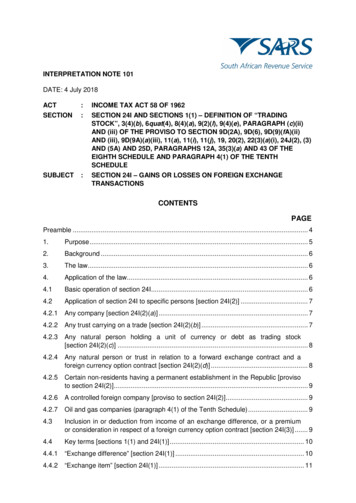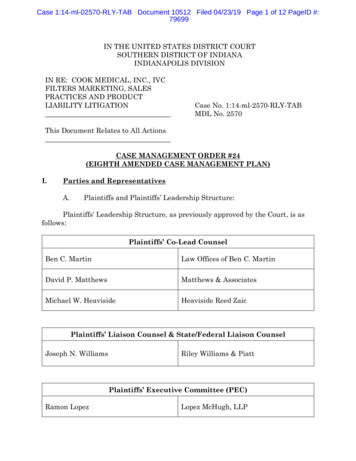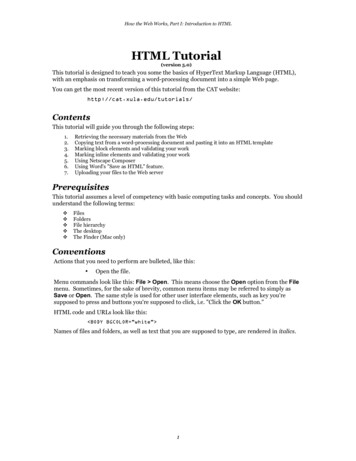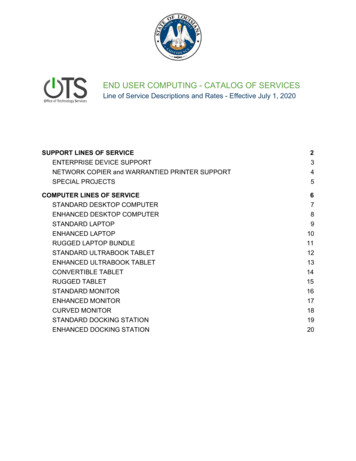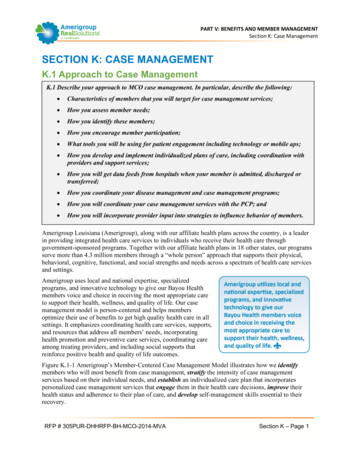
Transcription
PART V: BENEFITS AND MEMBER MANAGEMENTSection K: Case ManagementSECTION K: CASE MANAGEMENTK.1 Approach to Case ManagementK.1 Describe your approach to MCO case management. In particular, describe the following: Characteristics of members that you will target for case management services; How you assess member needs; How you identify these members; How you encourage member participation; What tools you will be using for patient engagement including technology or mobile aps; How you develop and implement individualized plans of care, including coordination withproviders and support services; How you will get data feeds from hospitals when your member is admitted, discharged ortransferred; How you coordinate your disease management and case management programs; How you will coordinate your case management services with the PCP; and How you will incorporate provider input into strategies to influence behavior of members.Amerigroup Louisiana (Amerigroup), along with our affiliate health plans across the country, is a leaderin providing integrated health care services to individuals who receive their health care throughgovernment-sponsored programs. Together with our affiliate health plans in 18 other states, our programsserve more than 4.3 million members through a “whole person” approach that supports their physical,behavioral, cognitive, functional, and social strengths and needs across a spectrum of health care servicesand settings.Amerigroup uses local and national expertise, specializedprograms, and innovative technology to give our Bayou Healthmembers voice and choice in receiving the most appropriate careto support their health, wellness, and quality of life. Our casemanagement model is person-centered and helps membersoptimize their use of benefits to get high quality health care in allsettings. It emphasizes coordinating health care services, supports,and resources that address all members’ needs, incorporatinghealth promotion and preventive care services, coordinating careamong treating providers, and including social supports thatreinforce positive health and quality of life outcomes.Figure K.1-1 Amerigroup’s Member-Centered Case Management Model illustrates how we identifymembers who will most benefit from case management, stratify the intensity of case managementservices based on their individual needs, and establish an individualized care plan that incorporatespersonalized case management services that engage them in their health care decisions, improve theirhealth status and adherence to their plan of care, and develop self-management skills essential to theirrecovery.RFP # 305PUR-DHHRFP-BH-MCO-2014-MVASection K – Page 1
PART V: BENEFITS AND MEMBER MANAGEMENTSection K: Case ManagementIntegrated Case Management ProgramWe deliver integrated, locally-based, telephonic and field-based case management services, including carecoordination for pregnant members and those with physical and behavioral conditions. Our integratedteam consists of Case Managers with physicalFigure K.1-1. Amerigroup’s Integrated Caseand behavioral health expertise who workManagement Programtogether in our three regional offices and thecommunity to facilitate closecollaboration. Their primary goal isdeveloping a single, integrated careplan that is holistic, meets the biopsychosocial needs of the member,and guides the delivery of quality,well-coordinated care.In order to fully integrate ourmembers’ health care, we haveestablished processes, policies, andprocedures for working withmembers, caregivers, families,providers, and externalorganizations providing servicescarved out of the Louisiana BayouHealth program, such as specializedbehavioral health services, dentalcare, and home and communitybased services and supports(HCBS). This integrated system facilitates consistent teamwork, frequent training opportunities, andregular access to clinical consultation that supports information sharing and brainstorming among clinicalstaff to promote optimal health and independent living outcomes for our members.Our integrated case management program drives the processes, policies, procedures, and tools thatsupport the following activities: Identification of potential or actual case management needs through early screening and assessment Stratification of risk levels Development of an integrated care plan that addresses traditional and non-traditional, communitybased, and carved-out supports and services Reciprocal referrals and information sharing Care coordination, including scheduling appointments, arranging transportation, conductingappointment reminder calls, following up to verify service initiation, member progress, and need forservice adjustment and incorporation into the care plan Evaluation, including reviewing, tracking, monitoring, adjusting, and analyzing for outcomes, qualitymatrices, and performance improvement Emphasis on disease prevention and chronic condition management Greater access to specialty servicesRFP # 305PUR-DHHRFP-BH-MCO-2014-MVASection K – Page 2
PART V: BENEFITS AND MEMBER MANAGEMENTSection K: Case ManagementCharacteristics of Members Identified for Case ManagementAmerigroup will prospectively review DHH-provided claims, internally generated reports, screening andassessment results, Nurse Medical Management team referrals, and provider information to identifymembers who may need case management services. Our predictive model, including the Chronic IllnessIntensity Index (CI3) and Likelihood of Inpatient Admission (LIPA) scores, assigns a risk score basedon the member’s characteristics, and the level of care provided correlates to the severity of the score. Itconsiders past utilization (claims, authorizations), general demographics, and information on aidcategories to hone in on those members who will benefit most from case management.The member characteristics we identify for case management include: Members with disabilities, home health, personal care, targeted case management, and HCBS needs Members with more than three non-emergent emergency department (ED) visits and ED Triage Scoreindicating a likelihood of continued ED use for low-level visits Members at high-risk for admission and readmission to an inpatient setting Women with high-risk pregnancies and newborns with complications at or following birth Clinically manageable conditions, such as HIV/AIDS, cardiovascular or pulmonary disease, diabetesor metabolic disorders Multiple medication prescriptions with high or low utilization Co-occurring or co-morbid physical and behavioral health diagnoses Members with a behavioral health predictive score indicating likelihood of a first-time inpatientadmission for substance use disordersAssessing Members’ NeedsOnce members are enrolled in case management, we assign them aLouisiana-based Case Manager to work closely with the memberand, with the member’s permission, family, caregivers, andproviders to complete the assessment. After establishing contactwith the member, our Case Manager completes an initial assessmentusing a standardized, best practice tool. The Case Manager assesses the member’s total health care needsholistically, including physical, behavioral, functional, cognitive, and social factors, as well as access tocare. We focus specific attention on developing tools and processes that facilitate member participation inthe comprehensive assessment. Through that assessment, we gather a full understanding of the member’shistory, perceptions, and overall goals. The comprehensive assessment focuses on learning about themember’s functional, physical, mental, and support status, then asks targeted questions regarding themember’s and caregiver’s perception of needs. The comprehensive nature of the assessment provides thecare coordinator with a holistic view of the member.By conducting such a thorough interview, the case manager builds trust and credibility with members,their providers, and natural supports. This trust is tantamount to person-centered care planning. Inaddition to assessing the member’s needs and preferences, care coordinators conduct a risk assessment todetermine whether the member’s preferences and needs can be safely addressed in the setting theychoose. The case manager carefully reviews any identified risks with the member and together theydevelop a risk agreement that details steps to mitigate those risks. The case manager also makes sure thatthe member is fully aware of any potential outcomes that may occur if the risk is not addressed. This opendiscussion fosters trust as the case manager and member work together to develop a person-centered planthat achieves the individual’s goals.RFP # 305PUR-DHHRFP-BH-MCO-2014-MVASection K – Page 3
PART V: BENEFITS AND MEMBER MANAGEMENTSection K: Case ManagementWhile the assessment is a standardized tool, the process relies on the Case Manager’s judgment andexperience, with supervision as needed, to evaluate and apply its findings. This involves both objective(lab values) and subjective (emotional stability) factors. Our Case Manager completes updates to themember’s assessment as needed based on significant changes in the condition, situation, and needs.Identifying Members for Case ManagementWe proactively identify members who may benefit the most from case management. Our ContinuousCase Finding (CCF) process uses predictive modeling tools that enable monthly data mining to identifyand prioritize candidates for case management. The process begins each month with a review of the entireeligible member population. Members are identified through review of their available past 12 months ofclaims data. Additionally, the system considers member historical information, including diagnosis anddemographics, to predict future outcomes.Our predictive modeling tool enables us to proactively identify members who may need additionalsupport. We also identify members for case management through welcome calls, our “no wrong door”approach, and network providers. Our multi-faceted, proactive approach allows us to intervene quicklyand engage members in the level of support they need to achieve positive health outcomes and enhancedquality of life.Predictive ModelingUsing the retrospective two years of claims data provided by DHH, Amerigroup identifies members whomay have initial or on-going high-risk, complex, chronic or co-occurring needs, and may need additionalsupport and/or referral during and after transition. We review provider types, procedure codes, dates ofservice, and other indicators, as well as data provided by external organizations providing carved-outservices, such as specialized behavioral health services, dental care, and HCBS.Our predictive modeling tool enables us to stratify all members appropriately based on their level of riskfor adverse outcomes. We can then identify members with special health needs and conduct outreach toprovide them with the services and supports they need to experience positive health outcomes.The Chronic Illness Intensity Index (CI3) is a predictive model designed to support the Case ManagementProgram. The CI3 score quantifies a member’s relative predicted cost in the next year compared to theaverage Amerigroup Medicaid member, and enables targeting of members with chronic complex needswhose costs and clinical outcomes can be impacted through care management. It is based on AdjustedClinical Groups (ACG), a model from Johns Hopkins University, which uses demographic, diagnostic,pharmacy, and claims data to predict future resource needs. For example, a member with a CI3 score of 1is expected to have average medical costs over the next year, whereas one with a score of 3 is expected tobe three times sicker/costlier than the average.For those with the highest complex needs, we use the Likelihood of an Inpatient Admission (LIPA)score to determine which members are likely to have an admission in the next 60 days. It is aproprietary model that was built internally specifically for the Medicaid population. Along with ourclinically manageable conditions list and LIPA score, the CI3 allows us to prioritize members intointervention groups and proactively connect those most in need with intensive case management services.Every month, each member is scored and that, along with extensive clinical and utilization data, areprovided to the clinicians in a user-friendly format. Finally, clinical-level member outcomes are provided,enabling the case management team to efficiently monitor caseload.RFP # 305PUR-DHHRFP-BH-MCO-2014-MVASection K – Page 4
PART V: BENEFITS AND MEMBER MANAGEMENTSection K: Case ManagementStratification by Risk LevelCase Managers use a prospective systematic approach to identify members with a risk of poor healthoutcomes and target them for case management services. This continuous case finding (CCF) systemevaluates members of a given population according to disease factors and claims history to improvequality of life through proper use of necessary services and reduction of unnecessary services. Thisgrouping triggers care management interventions commensurate with member risk levels needs, assuringthat those who need immediate interventions receive the highest priority, as summarized in Table K.1-1below.Table K.1-1. Individualizing Interventions to Align with Individual Risk LevelsGroupLevelLow RiskLow to ModerateService NeedsModerateRiskModerate CaseManagementService NeedsHighRiskHigh ComplexCase ManagementService NeedsPredicted HighComplex CaseManagementService NeedsPredictedHighRiskDescriptionIdentified for non-clinician outreach interventions by ourDisease Management Centralized Care Unit (DMCCU).These members receive health promotion outreach, andthose eligible for disease management may receive thefollowing interventions: a program enrollment letter and anautomated telephonic contact/educational outreach toassist them in better self-managing their specific conditions.Targeted for interactive contact by the DMCCU.Members with the highest risk scores are queued forclinical outreach until caseload threshold is obtained.Members with more intensive needs will be referred tothe local health plan case management team.Served by our Louisiana based staff through telephonicor face-to-face case management interventions based oneach member’s individual assessed needs or request.Members predicted to have high complex casemanagement service needs. These members’ needs areserved by our Louisiana based staff through telephonicor face–to-face case management interventions basedon each member’s assessed needs or request.Most members of a given population do not exhibit characteristics that qualify for one of the three riskgroups; however, CCF recognizes that members’ heath status is highly fluid. Frequently, those who havenot been stratified into one of the risk groups are identified as potentially needing case managementservices. They are referred to the appropriate Louisiana-based case management unit to be screened,assessed, manually stratified, and managed according to their risk stratification (Group 1, 2, 3 or 4).New Member Engagement Strategies for Case ManagementAmerigroup recognizes the importance of engaging members quickly upon enrollment into our plan.Within 14 days of sending the welcome packet, we conduct New Member Welcome Calls using ourDHH-approved script to engage members, then identify immediate needs, including existing or potentialspecialized health care needs. New Member Welcome Calls give us the opportunity to establish a positiverelationship with all new members and to learn more about their needs so we can support them inachieving positive health outcomes and improved quality of life.RFP # 305PUR-DHHRFP-BH-MCO-2014-MVASection K – Page 5
PART V: BENEFITS AND MEMBER MANAGEMENTSection K: Case ManagementOur New Member Welcome Call DHH-approved script is designed to encourage members to sharehealth-related information, such as diagnoses, current health status, services and supports, history of EDuse and inpatient admissions, living environment, and social and natural supports that may indicatecomplex, chronic, co-occurring, and co-morbid conditions. We train our Member Services employees incultural competency and motivational interviewing to promote sensitivity and understanding during thewelcome call to maximize member comfort and sharing. If we identify members with specialized needsduring the call, our Members Services employees make a referral to our case management team forfurther outreach, screening, assessment, and referral as appropriate.Amerigroup recognizes that members with specialized needs may be difficult to reach at times. As aresult, when we are unable to reach someone after three attempts, we mail a letter directly to the memberoffering assistance and providing a phone number to call for assistance. We will notify DHH on amonthly basis of our members who are difficult to reach.Network Providers and Member EngagementAmerigroup recognizes that our network providers are a primary resource for identifying members forcase management. We require our providers to screen members for symptoms that may indicate potentialspecialized health care needs during every appointment and refer them to Amerigroup’s case managementprogram, as appropriate. We train providers and give them the tools they need to appropriately screen,identify, and refer members who may benefit from additional support.For example, more than half of patients seek treatment for behavioral health conditions from their PCPs;that results in non- psychiatrists writing more than three-fourths of antidepressant prescriptions.Amerigroup proposes to implement the PC-INSITE program for our Bayou Health population to improvethe detection, diagnosis, treatment, and on-going management of persons experiencing depression and/ora substance use disorder (SUD). The PC-INSITE creates supports within the primary care setting toenhance PCP tools for diagnosing and treatment of behavioral health conditions, such as depression andsubstance use disorder. This whole-person approach gives patients the care they need in single locationswhile reducing morbidity and costs. The vision of PC-INSITE is to detect, identify, and intervene withindividuals experiencing depression within primary healthservices. Depression impacts and complicates treatment ofother health conditions; its effective treatment improves overallhealth, delivering better outcomes.Through the implementation of PC-INSITE, Amerigroup seeksto achieve: Improved management of a member’s depression/SUDhealth, including other co-occurring conditions Enhanced health experience for the individual Improved health outcomes for the practice Lower health services costsRFP # 305PUR-DHHRFP-BH-MCO-2014-MVASection K – Page 6
PART V: BENEFITS AND MEMBER MANAGEMENTSection K: Case ManagementIn addition to these overall program goals, the PC-INSITE program will provide benefits to participatingprimary care practices: Increased capacity to screen, assess, and treat patients with depression Enhanced treatment of physical disease and conditions as depression can affect recovery andtreatment response Access to a Behavioral Health Coach to support patient treatment of depressionEncouraging Members to Participate in Case ManagementAmerigroup believes that people want to engage in their health care but experience fear, anxiety, andstress navigating an often overwhelming, confusing system. Our member-directed approach engagesindividuals in achieving their health and independent living goals by meeting them where they arephysically, emotionally, and socially, and offering opportunities to access services in a meaningful,convenient, and less stressful manner. We seek to connect with members where they are, by usingmultiple strategies to engage them in case management, including: Hiring and training the best staff Developing targeted case management programs Linking members to community-based resourcesBuilding Member Trust By Hiring and Training the Best StaffIn our experience, members are more likely to engage in services if they have a positive relationship withtheir case manager. Therefore, we pay special attention to our staff hiring and training practices.Amerigroup directly recruits, trains, and develops a team of highly qualified care coordinationprofessionals to provide our members with the highest quality services and supports. We actively seekindividuals who bring a passion for our organizational mission and a commitment to helping membersimprove their health and well-being. We know that case managers who show compassion andenthusiasm enable us to engage, educate, and support members, their families, and caregivers tomanage their own health. By hiring staff with the ability to establish warm and trusting relationships, weachieve sustainable improvements in members’ quality of life and ability to live independently.Our staff is the primary reason our members engage in our case management program. Amerigroup hirescase managers who live and work in the communities they serve.Case managers work in the field and are expected to spend their timeengaging members in face-to-face interactions that support them inachieving their individual health goals. Our case managers also workside-by-side with providers to assure members access to the servicesthey need, when they need them. Our staffing model affords casemanagers first-hand knowledge of the challenges faced by thecommunities we serve, as well as available community resources tosupport our members.Amerigroup is committed to providing case management staff withjob-related training to give them the tools and skills they need to best serve our members. Ourcomprehensive training program promotes a consistent, member-centered, and informed approach toidentifying those who can benefit from case management, developing two-way open communication thatfosters trust, engaging members in their health care decisions, and achieving positive outcomes throughcare that is holistic and tailored to their conditions. Case management staff undergoes comprehensiveRFP # 305PUR-DHHRFP-BH-MCO-2014-MVASection K – Page 7
PART V: BENEFITS AND MEMBER MANAGEMENTSection K: Case Managementtraining that builds the skills and knowledge they need to address the diverse needs of our members. Ourstructured course curriculum includes training modules that educate care coordinators on: Care coordination skills, such as motivational interviewing strategies for engaging or coachingmembers to build self-care and medication-adherence strengths Technology tools and resources to support the care coordination processes Tools to support members during care transitions Care coordination programs, such as Money Follows the Person and Consumer Direction Identification of complementary community supports outside the scope of Bayou Health benefitsBeginning with new hire training, we educate our staff on our member-centric approach to carecoordination, best practices, and strategies for engaging members as active participants in their servicedelivery. Throughout their employment, we provide on-going training, coaching, and supervision tosupport them in consistently applying these principles when serving our members. Table K.1-2 belowdescribes our focused, member-centered, and comprehensive training for case management staff thatcomprises several phases.Table K.1-2. Amerigroup Case Management Training ProgramLevelDescriptionCaseThis is designed to give new case managers focused training on theirManagementroles in the case management program. Major topics include:Skills and Introduction to the Amerigroup case management programProcesses Member identification, screening, and grouping Engagement and interviewing techniques Assessment, including problem identification Stratification and complexity leveling Case planning, including setting goals Interventions Monitoring, evaluating, and reporting Transfer, discharge evaluation, case closure Skills Practice Standards of careSystems TrainingThis training focuses on applicable IT systems and applications thatsupport Amerigroup’s case management and utilization management.Topics include: Integrated care management systems Application of relevant clinical criteria/guidelines and health caremanagement services overview HIPAA member rights Access to Amerigroup tools through Heartbeat, including authorizationrules, State Contracts, and policies.ContinuingTo enable case management staff to maintain competence, we have anEducationannual plan for providing them continuing education. It takes intoaccount staff needs based on on-going monitoring efforts, such as casemanagement audits to identify reciprocal referrals and sharing ofinformation.RFP # 305PUR-DHHRFP-BH-MCO-2014-MVASection K – Page 8
PART V: BENEFITS AND MEMBER MANAGEMENTSection K: Case onProgram – gram –Advanced LevelDescriptionAll case managers complete standard training on the following majortopics: Motivational interviewing overview and health coaching High-risk obstetrics Asthma Diabetes Chronic obstructive pulmonary disease Heart failure Pain management Behavioral health HIV/AIDS Renal diseaseCase managers who have achieved basic level certification completethis training that includes the following major topics: Essentials of Case Management: A Certification in Case ManagementPreparatory Course High-risk obstetrics Obesity management Wound care Family planning in women with mental illness The link between mental illness and metabolic syndrome The relationship between mental illness and neurological injury The recovery model Motivational interviewing Case managing members who are homeless or poverty-strickenWe also offer staff strategic training based on staff input, quality audits, and performance improvementactivities. In addition to formal training, Amerigroup provides staff members with opportunities toenhance their professional knowledge through clinical supervision, case discussions with the ChiefMedical Officer, and professional development exercises. These opportunities support our case managersin resolving specific member issues, in addition to teaching them skills they can apply when serving allmembers.RFP # 305PUR-DHHRFP-BH-MCO-2014-MVASection K – Page 9
CONFIDENTIALPART V: BENEFITS AND MEMBER MANAGEMENTSection K: Case ManagementConfidential, proprietary, and/or trade secret language has been redacted from this page. Please refer toour proposal binders marked “Original” to access a non-redacted version of our response.RFP # 305PUR-DHHRFP-BH-MCO-2014-MVASection K – Page 10
CONFIDENTIALPART V: BENEFITS AND MEMBER MANAGEMENTSection K: Case ManagementConfidential, proprietary, and/or trade secret language has been redacted from this page. Please refer toour proposal binders marked “Original” to access a non-redacted version of our response.RFP # 305PUR-DHHRFP-BH-MCO-2014-MVASection K – Page 11
CONFIDENTIALPART V: BENEFITS AND MEMBER MANAGEMENTSection K: Case ManagementConfidential, proprietary, and/or trade secret language has been redacted from this page. Please refer toour proposal binders marked “Original” to access a non-redacted version of our response.RFP # 305PUR-DHHRFP-BH-MCO-2014-MVASection K – Page 12
CONFIDENTIALPART V: BENEFITS AND MEMBER MANAGEMENTSection K: Case ManagementConfidential, proprietary, and/or trade secret language has been redacted from this page. Pleaserefer to our proposal binders marked “Original” to access a non-redacted version of our response.Developing Individualized Care PlansAmerigroup’s approach to service planning emphasizes member choice, self-determination, andcommunity integration. We work with members to determine how they want to live their lives andidentify the supports they need to achieve their wellness goals. Our case managers consult with membersand their natural supports to determine their unique needs, strengths, and preferences. We then integratethis information into a unified plan of care that includes the full spectrum of services (medical,behavioral, functional, and social supports). By doing so, we assist our members in enhancing theirquality of life.The culmination of our person-centered process is the plan of care, which is developed by the member,his/her support system, and the case manager. It incorporates the member’s wellness goals, history,natural supports, services (paid and unpaid), disaster plan, and even a pet’s name, as appropriate. The planof care clearly outlines the member’s goals and communicates the role each person plays helping theindividual achieve those goals. Our case managers then follow up on the member’s choices to connect theindividual to the services needed to achieve their recovery goals.Throughout the care planning process, we provide on-going clinical support for the member’s multidisciplinary care team through the clinical rounds process. Described below, clinical rounds bringtogether a multi-disciplinary team to develop targeted interventions for members with complex needs.Our goal is to develop creative solutions to address barriers to care, improving their health and wellness.RFP # 305PUR-DHHRFP-BH-MCO-2014-MVASection K – Page 13
PART V: BENEFITS AND MEMBER MANAGEMENTSection K: Case ManagementEngaging the Member in Creating an Integrated Care PlanCase managers develop a single member-directed care plan that incorporates all the interventionsnecessary to improve the individual’s health status across all conditions and reflecting all goals andpreferences. Our case management system makes the care plan accessible to all case managers, helpingteams work more effectively to assist members with co-morbid conditions. For example, a behavioralhealth case manager coordinating hospital discharge for a member with depression may need assista
Amerigroup Louisiana (Amerigroup), along with our affiliate health plans across the country, is a leader . together in our three regional offices and the community to facilitate close collaboration. Their prima
